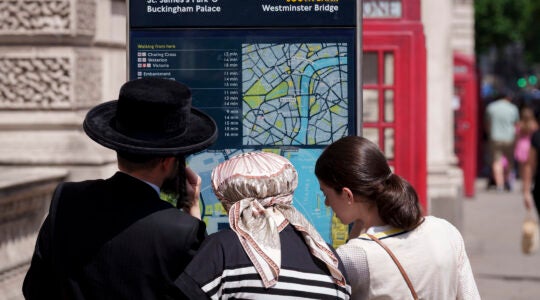
Palestinian Authority President Mahmoud Abbas, left,with U.N. chief of protocal Desmond Parker, waits to
address the General Assembly after submitting a formal application for U.N. membership, Sept. 23, 2011. (U.N./Marco Castro)

President Obama telling the U.N. General Assembly that it must take into account Israel’s security needs and the Jewish claim to the land, Sept. 21, 2011. (U.N./Marco Castro)
WASHINGTON (JTA) — After the mutual accusations of ethnic cleansing and the sarcastic posturing, the ball is back in the Palestinians’ court.
The upshot of last week’s Lollapalooza of speechmaking at the United Nations is that the Obama administration has succeeded in persuading the international community to back the resumption of talks without preconditions — a key demand of the government of Israeli Prime Minister Benjamin Netanyahu.
A statement released last Friday by the Quartet — the grouping of the United States, Russia, the European Union and the United Nations that guides Middle East peacemaking — “reiterated its urgent appeal to the parties to overcome the current obstacles and resume direct bilateral Israeli-Palestinian negotiations without delay or preconditions.”
The statement came just hours after Palestinian Authority President Mahmoud Abbas delivered a fiery address to the U.N. General Assembly demanding statehood recognition and setting as a condition for renewed talks a “complete cessation of settlement activity.”
Netanyahu’s U.N. address delivered the same day, by contrast, repeated his readiness to talk without preconditions.
“The day I came into office, I called for direct negotiations without preconditions,” he said. “President Abbas didn’t respond. I outlined a vision of peace of two states for two peoples. He still didn’t respond. I removed hundreds of roadblocks and checkpoints to ease freedom of movement in the Palestinian areas; this facilitated a fantastic growth in the Palestinian economy. But again, no response.
“I took the unprecedented step of freezing new building in the settlements for 10 months. No prime minister did that before, ever. Once again — you applaud, but there was no response. No response.”
Such exchanges have been boilerplate for the past year since talks collapsed, but Netanyahu followed up with something new: a public declaration that he was ready to abide by parameters set out by President Obama in a May 19 speech in which the U.S. leader called on the sides to negotiate borders using the 1967 lines, with agreed-upon land swaps, as the basis.
“In the last few weeks, American officials have put forward ideas to restart peace talks,” Netanyahu said in his U.N. address. “There were things in those ideas about borders that I didn’t like. There were things there about the Jewish state that I’m sure the Palestinians didn’t like. But with all my reservations, I was willing to move forward on these American ideas.”
Netanyahu was backing away from his previous insistence that Israel could not abide such conditions, as well as paying back Obama for his U.N. speech Wednesday in which the president made a forceful case for recognizing not just Israel’s security needs but its ancient stake in the region.
“Let’s be honest: Israel is surrounded by neighbors that have waged repeated wars against it,” Obama told the General Assembly. “Israel’s citizens have been killed by rockets fired at their houses and suicide bombs on their buses. Israel’s children come of age knowing that throughout the region, other children are taught to hate them. Israel, a small country of less than 8 million people, looks out at a world where leaders of much larger nations threaten to wipe it off of the map. The Jewish people carry the burden of centuries of exile and persecution, and the fresh memory of knowing that 6 million people were killed simply because of who they are.
“Those are facts. They cannot be denied. The Jewish people have forged a successful state in their historic homeland.”
The speech, which was greeted enthusiastically by American Jewish groups, may have sounded like a pitch to a domestic constituency by a president flailing in the polls, but administration officials insisted it was also part of a strategy: To get the parties to talk on the basis of the May 19 parameters outlined by Obama, which he sees as the only viable way toward achieving Palestinian statehood.
“If these negotiations are going to succeed, they must be serious and credible and deal with all of the core issues,” a senior administration official told reporters last Friday evening, requesting anonymity that is customary when discussing strategy. “I think a very important departure point — and it was stressed throughout this statement and in our discussions with the Quartet — has been the fact that the remarks of President Obama in May that are guiding us and that provide the solid foundation for the negotiations to succeed. And in fact, I think the Quartet in the statement is making clear those ideas that are key.”
The Quartet statement also outlines a timeline for talks, and says borders and security should be the priority for the first three months, with a deadline for an agreement of the end of 2012. That made some pro-Israel groups nervous.
“We believe the Quartet erred in setting a preliminary agenda limited to issues of security and borders and timetables for proposals,” the Anti-Defamation League said in a statement. “By going as far as it does, the Quartet statement misses an opportunity to send the clearest possible message to the Palestinians that the sole path to statehood lies in direct negotiations with Israel.”
Overall, however, the pro-Israel reaction was one of relief at the perception that the onus was on the Palestinians to turn up for talks or explain why they were a no-show. The White House’s top Middle East official, Dennis Ross, briefed Jewish leaders on the week’s events in a conference call last Friday evening just before the Sabbath. One participant described getting the international community on board for talks as a “masterful job.”
It remains to be seen how the U.N. week will play out in the immediate future. Upon returning home, Abbas and Netanyahu both received adulatory welcomes from their respective publics for speeches that included charges of “ethnic cleansing” on both sides.
Democrats and Republicans in the Congress stepped up demands to cut off the approximately $600 million in aid received annually by the Palestinian Authority, both because of Abbas’ statehood bid and because of talks with Hamas aimed at setting up a unity government.
“President Abbas has been warned repeatedly,” said Rep. Nita Lowey (D-N.Y.), the senior Democrat on the U.S. House of Representatives’ foreign operations subcommittee of its Appropriations Committee, in a statement to JTA. “I remain firm: his action crosses a line and should lead to a reevaluation of U.S. assistance for the PA.”
But Israel and some of its closest allies in the pro-Israel community are quietly pushing back against an assistance cutoff, saying security cooperation between Israel and the Palestinian Authority has been key to maintaining the quiet in the West Bank.
The explosion that some Israelis had feared in the wake of Abbas’ statehood demand never materialized, although a father and baby apparently were killed last Friday in a stone-throwing attack near Kiryat Arba. The same day, a Palestinian man died when Israeli soldiers fired on Palestinians near Ramallah who had been clashing with settlers who were torching their groves.
Additionally, Abbas — while sticking to his insistence on a settlement freeze — said he was otherwise ready to come back to the table, and notably did not set a deadline for the United Nations to address his membership request. Meanwhile, his unity talks with Hamas are all but moribund.
Nonetheless, pleas from Israel and its friends might not stop a Congress bent on cutting waste from trimming the Palestinians right out of the budget.
“I understand that Israel might want this funding for the Palestinians,” Rep. Ileana Ros-Lehtinen (R-Fla.), the chairwoman of the House’s Foreign Affairs Committee, said on CNN last week. “I’m worried about the U.S. taxpayers.”
JTA has documented Jewish history in real-time for over a century. Keep our journalism strong by joining us in supporting independent, award-winning reporting.





